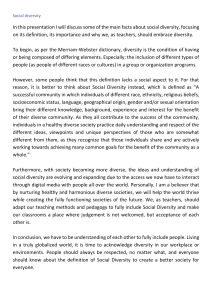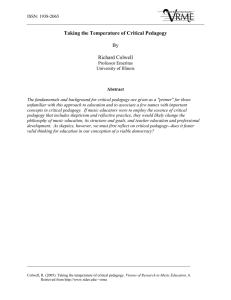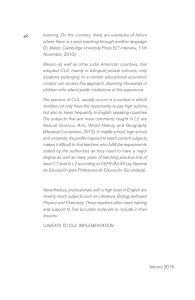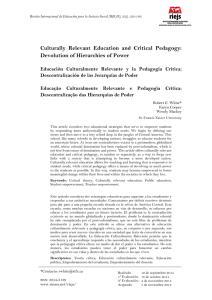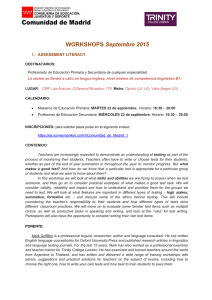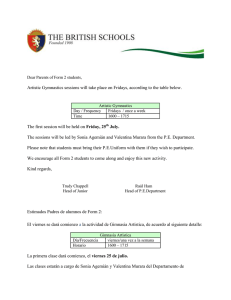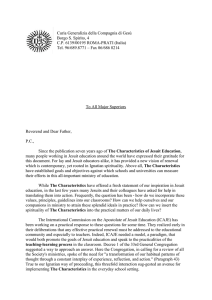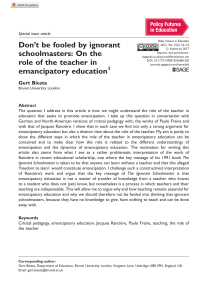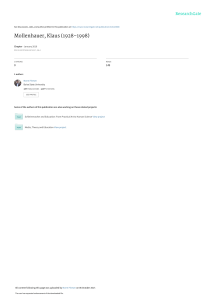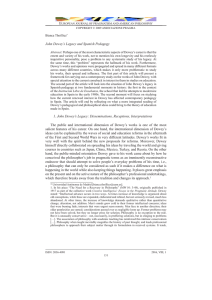Reflections Seen from Critical Pedagogy and other Related
Anuncio
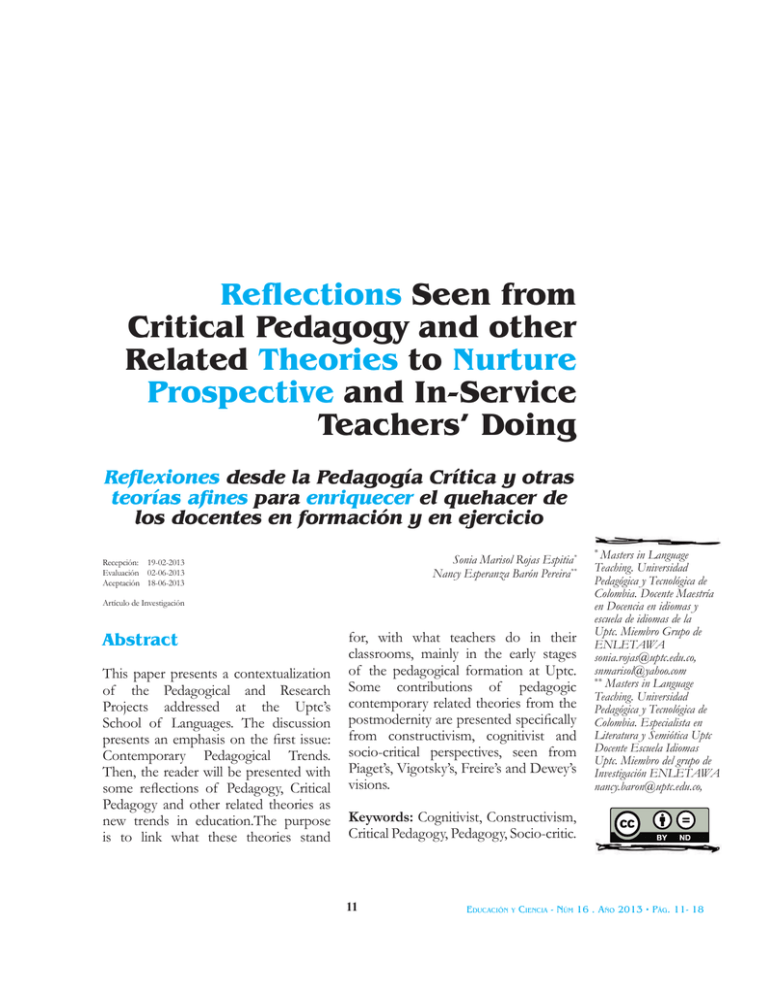
Reflections Seen from Critical Pedagogy and other Related Theories to Nurture Prospective and In-Service Teachers’ Doing π Reflections Seen from Critical Pedagogy and other Related Theories to Nurture Prospective and In-Service Teachers’ Doing Reflexiones desde la Pedagogía Crítica y otras teorías afines para enriquecer el quehacer de los docentes en formación y en ejercicio Sonia Marisol Rojas Espitia* Nancy Esperanza Barón Pereira** Recepción: 19-02-2013 Evaluación 02-06-2013 Aceptación 18-06-2013 Artículo de Investigación Abstract This paper presents a contextualization of the Pedagogical and Research Projects addressed at the Uptc’s School of Languages. The discussion presents an emphasis on the first issue: Contemporary Pedagogical Trends. Then, the reader will be presented with some reflections of Pedagogy, Critical Pedagogy and other related theories as new trends in education.The purpose is to link what these theories stand for, with what teachers do in their classrooms, mainly in the early stages of the pedagogical formation at Uptc. Some contributions of pedagogic contemporary related theories from the postmodernity are presented specifically from constructivism, cognitivist and socio-critical perspectives, seen from Piaget’s, Vigotsky’s, Freire’s and Dewey’s visions. ∗ Masters in Language Teaching. Universidad Pedagógica y Tecnológica de Colombia. Docente Maestría en Docencia en idiomas y escuela de idiomas de la Uptc. Miembro Grupo de ENLETAWA [email protected], [email protected] ∗∗ Masters in Language Teaching. Universidad Pedagógica y Tecnológica de Colombia. Especialista en Literatura y Semiótica Uptc Docente Escuela Idiomas Uptc. Miembro del grupo de Investigación ENLETAWA [email protected], Keywords: Cognitivist, Constructivism, Critical Pedagogy, Pedagogy, Socio-critic. 11 EducaciÓn y ciEncia - nÚM 16 . añO 2013 • Pág. 11- 18 π Sonia Marisol Rojas Espitia - Nancy Esperanza Barón Pereira Resumen Este artículo presenta una contextualización de los proyectos pedagógicos e investigativos que dirige la Escuela de Idiomas de la Universidad Pedagógica y Tecnológica de Colombia (Uptc). La discusión enfatiza en las tendencias pedagógicas contemporáneas; en consecuencia, el lector encontrará algunas reflexiones pedagógicas desde la Pedagogía Crítica y otras teorías relacionadas con las nuevas tendencias en educación; el propósito es vincular lo que representan estas teorías con lo Educación y ciEncia - núm 16 . año 2013 • Pág. 113 - 18 12 que hacen los profesores de Proyectos pedagógicos e investigativos en sus aulas, sobre todo en las primeras etapas de la formación pedagógica en la Uptc. Además, se presentan algunas de las contribuciones de las teorías pedagógicas que se relacionan con contemporáneos de la posmodernidad, específicamente constructivistas, cognitivistas y sociocríticas, vistas desde Piaget, Vigotsky, Freire y visiones de Dewey. Palabras clave: Cognitivismo, Constructivismo, Pedagogía, Pedagogía Crítica, Socio-crítica. Reflections Seen from Critical Pedagogy and other Related Theories to Nurture Prospective and In-Service Teachers’ Doing inTRODUcTiOn “Dejad de concebir la Educación como una preparación para la vida ulterior, y haced de ella la significación entera de la vida presente” John Dewey Education is a process inherent to every human being, Pedagogy is the art of teaching, Didactics guides the teaching-learning process and the Critical Pedagogy as a new trend in Education which invites us to reflect beyond the pedagogical task. Thinking about education in the XXI century is an interesting concern. The new Pedagogical Contemporary Trends from the Post modernity engage us, both teachers and students to participate in the construction of a more reflective school. Building Critical Pedagogy is one of the challenges and to achieve this purpose, it is relevant to understand the principles of some related pedagogical trends seen from the Constructivism, Cognitivism, Meaningful Learning, Teaching for Understanding, Multiple Intelligences, and Humanistic learning among others. These theoretical referents will undoubtedly support inservice teachers and future teachers to think Education as a project for all. The insights of Critical Pedagogy enrich this panorama. This article intends by one hand, to present the reader with a contextualization of the Pedagogical and Research Projects at the School of Languages, specifically of the first one and then, there will π be a discussion upon the theoretical issues that support this. In that sense, a reflection of Education through History, Pedagogy from the vision of Freire, Vigotsky, Piaget and Dewey and Critical Pedagogy is presented. PedagogiCaL and researCH ProJeCts at tHe sCHooL oF Languages and tHeir BasiC Foundations The PPI(s) (Pedagogical and Research Projects) are part of the interdisciplinary area and are addressed from the Faculty of Education. They are divided in four thematic areas. PPI 1-Contemporary Pedagogical Trends; PPI 2- Education, Policies and Management; PPI 3Curriculum, Pedagogy and Didactics and PPI 4- Pedagogy, its recipients and problems. This current proposal has been implemented since 2010. In this opportunity we will discuss upon the first Pedagogical and Research Project (Academic Committee from Education Faculty, 2010) The Pedagogical and research projects are structured from three different levels: theoretical-conceptual, didacticcreative, and practical-researchable. The theoretical-conceptual level is in charge of the appropriation of concepts to approach the contemporary problems about Education and Pedagogy. To achieve this purpose, it is crucial to use reading sessions that allow students to formulate research questions and problems which are relevant to the Colombian School. The didactic-creative field deals with the generation of varied ways to produce knowledge from the part of the teacher, 13 EducaciÓn y This article intends by one hand, to present the reader with a contextualization of the Pedagogical and Research Projects at the School of Languages. ciEncia - nÚM 16 . añO 2013 • Pág. 11- 18 π Sonia Marisol Rojas Espitia - Nancy Esperanza Barón Pereira as well as from the students (future teachers). It is necessary to make use of different didactic resources, dynamics and techniques which allow the articulation of the theoretical concerns with the practice of the teacher. The practical-researchable field intends students to develop research practices in relation to: state of the art, structure and knowledge about data collection techniques and the introduction to the analysis and interpretation of information. The previous concern will be articulated through the contact of students-teachers with the different educative institutions, through observation, the wondering of different research questions and the development of proposals that look to provide information about the different research problems. The school principle was marked by instruction and discipline. Students on their part were docile, receptive and obedient. EducaciÓn y This is the first one out of the four designed for the “Licenciados” both training and formation at the UPTC in the Languages programs. This course is intended to enable future teachers to explore, observe, understand and reflect on main constructs and practices dealing with Pedagogy as the explicit fundamental knowledge of education. The project encloses the Pedagogical Contemporary Trends, as formative processes necessary to understand the comprehension of the teaching and its epistemological thought worked along the history of education. The theoretical foundations proposed for this course, provide the students with the Universal principles that give support to the formative labor. Along this project, the students are expected to get in contact with real nearby academic settings, where they can confront related theories with practice ciEncia - nÚM 16 . añO 2013 • Pág. 113 - 18 14 and gain insights starting from their incursion in educative research. The next paragraphs highlight some contributions of Pedagogy seen from different periods and trends. BrieF Consideration oF eduCation aLong History Throughout the time Education has occupied the attention of thinkers. Traditional Education built the essential thought of the ancient ideas of Education whose end resided in the application of rules and the development of behavior. In that moment of history, the school did not maintain an engagement with other social institutions. The school principle was marked by instruction and discipline. Students on their part were docile, receptive and obedient. Books especially textbooks were the responsible of wisdom while the teacher’s role was to transmit knowledge. Learning meant the acquisition of what had been done in the books by elder people. Every teaching activity was the result of a finished product. There was no possibility for the teacher to add any new information. The main purpose of traditional education was to prepare the young to exercise a future responsibility. In that sense, the learner would gain success in life, as the result of having stored an organized body of information and having been trained in abilities to comprehend the instructional material. All of these ideas share the principles of behaviorism as a pedagogical trend that still remains alive in our classrooms. Early pre-service teacher practices, whose main purpose resides on a reflection Reflections Seen from Critical Pedagogy and other Related Theories to Nurture Prospective and In-Service Teachers’ Doing based on observation, evidence that despite the new trends in education that go further behaviorism, it continues being part of our daily practices. Of course teachers have adopted other practices taken from more constructivist and social perspectives, but we still trust on behaviorism to assure that information has been learnt. some contrIbutIons seen from tHe crItIcal Pedagogy Paulo Freire our Latin-American Brazilian thinker presents us his insights about Critical pedagogy. In his books “Pedagogy of the Oppressed” and “Pedagogy for the Autonomy”, he focuses the Critical pedagogy as a reaction to the traditional education, whose principles as have been mentioned before, reside in the belief that the teacher teaches, knows everything and is an active subject, while the student learns, knows nothing and is a passive subject in the process of learning. He also adds that the subject and knowledge are immersed in Education. The learner is not an empty vessel to be filled by the teacher; he is not an object of education. “Studying is a form of reinventing, re-creating. Re-writing is a subject’s not an object’s task” (Freire, 1985, p. 2, in Shor, 1987). Freire proposes the methodology of problem posing method, as an alternative that encloses three phases: Listening, dialogue and action. He proposes the idea of going from action-reaction to actionreflection that at the end is the core of communication. All of his thoughts and contributions in regards to Critical π Pedagogy, commit us to develop a sense of a more responsible understanding of the world we live in. Freire (in Shor, 1987) in regards to the method of Education based on the posing of problems, as a perspective for transformation; and specifically in his writing in 1950 concerning the Culture Circles, invites us to challenge students to think critically through reading and writing as social literacy practices. Freire approaches that education is a nonneutral issue. This occurs in a classroom or in a community; the interaction between teacher and student does not take place in the vacuum. Education begins from people experiences and challenge of the existing social forces that maintain the experiences passive. Freire (1971, p. 35, in Shor, 1987) says that the purpose of Education should be of human liberation, which “takes place to the extent that people reflect upon… the relationship to the world in which they live. And … in awareness themselves, they insert themselves in history as subjects”. In fact this is part of our pre-service teachers’ doing. Early teachers’ practices look to empower future teachers to see education as a social practice. In their permanent and focused reflections they have the chance observe critically and systematically to be able to describe what they observe and to reflect upon what they think of what they observe. In that sense, they have the possibility to be heard. The final objective is to establish a connection between the theories discussed in class and their actual observation at schools. Actually this is a door for them to become critical thinkers. 15 EducaciÓn y Paulo Freire our Latin-American Brazilian thinker presents us his insights about Critical pedagogy. ciEncia - nÚM 16 . añO 2013 • Pág. 11- 18 π Sonia Marisol Rojas Espitia - Nancy Esperanza Barón Pereira Freire (1985, in Shor, 1987) also contributes that, to achieve education; a dialogical approach should be considered. It means that studentteacher; administrator-teacher; learnermember of the community participate as co-learners. In fact, the School as educational organization should be committed in the search of a shared learning vision among all of its members. The main objective of dialogue is the development of a critical thought, as a practice that goes beyond the perceptions towards the action and the making of decisions, that people take to mold and gain control over their lives. In the same line of thought, Critical Pedagogy is considered by other authors as a fundamental practice in the process of teaching-learning of today’s school. McLaren, 1998 and Summer in Wink (2000, p. 45) define the Critical Pedagogy as “a way of thought to negotiate and transform the relationship among teaching in the classroom, the production of knowledge, the institutional structures of school and the social and material relationships of the community, the society and the nation”. They define the Critical Pedagogy “as a prism that reflects the complexities of the interaction between teaching and learning”. An important group of thinkers, pedagogues, psychologists and philosophers from different parts of the world have shared their visions with Freire such as Vigotsky, Piaget, Dewey among others EducaciÓn y The Critical pedagogy empowers us to see the reality widely and deeply. This prism has the tendency to focus on the shadows of social, cultural, politic and even economic conditions. Everything is done in the Critical pedagogy under the wide vision of history. There have been other related visions that have attempted to construct a new perspective in ciEncia - nÚM 16 . añO 2013 • Pág. 113 - 18 16 education. They have gone beyond the principles of traditional education and they have surged as a reaction to other theories as behaviorism, that despite the fact that this is a contemporary theory from postmodernity, it shares the principles of the traditional education. In fact this was the point of departure for other theories to emerge. The next paragraphs will address these visions. Some Visions about Pedagogy from different Authors’ Perspectives An important group of thinkers, pedagogues, psychologists and philosophers from different parts of the world have shared their visions with Freire such as Vigotsky, Piaget, Dewey among others; Vigotsky with his contributions to the Social Constructivism, Piaget and his work in the Psychological Constructivism and Cognitivism, and Dewey with his approach to see the Education as a process of holistic development. Other related theories and Pedagogical Practices are found as the ones proposed by Gardner with his contributions to multiple intelligences and teaching for understanding, Ausubel with his work on the development of meaningfullearning, and Benson with his theory of the development of autonomy. In this opportunity we will make reference to the three first authors. Vigotsky, the Russian Psychologist presents us his contributions in regards to Constructivism whose approach considers both: students and teachers. He places the learner as an active subject able to solve problems. The teacher is the one who creates and designs the Reflections Seen from Critical Pedagogy and other Related Theories to Nurture Prospective and In-Service Teachers’ Doing learning experiences based on situations that empower and engage students to build their own reality that help them to develop a critical thought. Brooks and Brooks (1999) add that in the Constructivism as in Freire with the Critical Pedagogy, learning is focused more on the learner than in the teacher. The Constructivist theory of learning empowers the social interaction with peers as an effective method to acquire skills to share knowledge. The previous considerations allow us to assume that the Constructivism favors the Cooperative Learning, as a way to create the learning community that leads to the development of critical thinking and consequently to the development of autonomy. Vigotksy speaks about the ZDP (Zone of Proximal Development) in which an assisted knowledge and an independent one exist. In the former the individual requires a guide to approach learning. The latter, the learner is able to elaborate his mental structures without support. The ZDP is seen as the potential that every person owns to learning and how this is molded in the social context in which this takes place. Through social interaction we learn how to use pedagogical tools to achieve our purposes. Piaget, The Swiss Psychologist favors the idea of Cognitivism in which the learner approaches knowledge as a personal conquers. Attention, memory, judgment are fundamental aids in the development of cognition. Unlike Vigotsky, Piaget assumes that the social context does not influence the processes of learning, but undoubtedly his similarity resides, in that he sees the subject able to develop π a complex process of cognition to approach learning. Definitely in this Paradigm the learner is the center of learning able to organize code, categorize, and evaluate the information, with the purpose to construct a mental schema used to accede and interpret the reality. The individual is immersed in a mental process. The incoming information is a process of assimilation, accommodation and equilibration. Piaget’s principal contribution deals in that, the child should explore, manipulate, experiment, question and look for answers to his quests. The teacher in turn, should allow the student do what he decides to do, he places teaching depending on the actual, cognitive child’s level; the instruction is individual. The teacher performs as a guider who stimulates the students, who is aware of their mistakes and consequently teaches them to learn from them. Dewey (in Clavijo, 2000) critiqued the traditional concept of education that presented knowledge as a static issue, based on the development of abilities and without any relationship with the learner experiences. He based his theory on Darwin who supports the idea that the man as well as the species are adapted and change their external conditions. Dewey considered that Education is a social process, where the classroom is seen as a social group. Dewey as well as Freire raises the Education based on problems posing in which the learner establishes a relationship with the world he is surrounded by. Dewey’s method is social and active. It is social because education is built through the social context as Vigotsky 17 EducaciÓn y Vigotksy speaks about the ZDP (Zone of Proximal Development) in which an assisted knowledge and an independent one exist. ciEncia - nÚM 16 . añO 2013 • Pág. 11- 18 π Sonia Marisol Rojas Espitia - Nancy Esperanza Barón Pereira would support. Education is active, when we approach the children primitive activities as a point of departure in each stage of their growing up, taking into consideration their innate, natural and direct wish. To sum up, Dewey, Freire, Vigotsky and Piaget are precursors of active education; in their visions about education and school, the learner’s role is to question the teacher’s role, is able to put in crisis what is said or done. Learning is shared. The student learns from his teacher and vice versa. In this relationship authoritarianism and dogmatism are not conceived. The teacher’s mission is to produce in the student the doubt, the curiosity and the interest to discover learning. It is worth saying that all the previous considerations from these thinkers and related theories have been a solid foundation in the formation of our assumptions as teachers. Our teachers and students’ pedagogical practices and professional development, have found support and relevance in studying and reflecting about these postmodern approaches. In this sense and taking into account what has been discussed in the paragraphs above, it is valuable in here to connect these pedagogical theories with our understanding in the formation of ourselves as in-service teachers and consequently of our future teachers. RefeRences To sum up, Dewey, Freire, Vigotsky and Piaget are precursors of active education; in their visions about education and school, the learner’s role is to question the teacher’s role. EducaciÓn y brooks, M.G. & Brooks J.G. (1999). The Courage to be Constructivist. Educational Leadership, from Ebsco. CaiCedo, Y. y Pulido, O. (2010). Currículo: “Discurso y Práctica de la Pedagogía”. Pedagogía y Currículo. Seminario Permanente de Pedagogía. Vicerrectoría Académica. Facultad de Ciencias de la Educación, UPTC. ClaViJo, A. (2000). Formación de maestros. Historia y vida. Reflexión y praxis del maestro colombiano acerca de la lectura y la escritura. Bogotá: Plaza & Janés. Instituto Tecnológico y de Estudios Superiores de Monterrey (2004). Los paradigmas de la educación. Recuperado de: http://www.cca.org.mx/dds/cursos/competenciastec/modulo_1/actividades1/solotexto_1.htm. Freire, P. (1997). Pedagogía de la Autonomía. Siglo veintiuno editores. kumaraVadiVelu, B. (2003). Critical Language Pedagogy. A post method perspective on English Language Teaching. World Englisehes, 22(4), pp. 539-550. short, I. (1987). Freire for the Classroom. A Source Book for Liberator Teaching. Doynton/ Cook Publisher. Wink, J. (2000). Critical Pedagogy. Notes from the Real World. NY: Addiesm. Wesley. Logman. ciEncia - nÚM 16 . añO 2013 • Pág. 113 - 18 18
